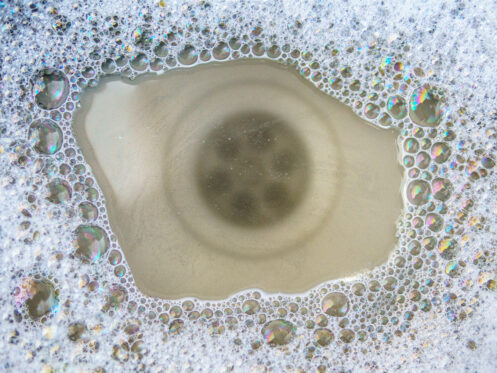One of the most frustrating problems you can experience with your plumbing system is a clog. When the line becomes completely clogged, your plumbing system won’t be able to drain wastewater from your home. Even partial clogs can cause major problems. By understanding some of the most common causes of these clogs, you can work to effectively minimize your risk of experiencing them.
Grease, Fats, and Oils
Grease, fats, and oils are among the best-known causes of plumbing clogs. When you first pour these items down the drain, they’re in a liquid state. As they travel down the pipe, they cool and start to solidify. This creates a gel-like substance that attracts other solids in the wastewater. Over time, debris becomes trapped in the piping, narrowing the opening. Eventually, the drainage slows until you have a complete clog.
Hair
Hair is another common plumbing clog cause. Unfortunately, hair bonds well with soap scum as it flows down the shower and sink drains. Hair tends to be quite dense, allowing it to create clogs relatively quickly, and it can attract other debris just as quickly and expand the size of the clog to block the drain.
Soap Scum
Any time you use traditional soap with hard water, it creates limescale buildup. The resulting soap scum solidifies over time on various surfaces, including the inside of your drain piping, and it thickens gradually until you have a complete blockage inside the drain line through which even wastewater cannot penetrate.
Food Scraps
Far too often, homeowners who have garbage disposals believe they can put a lot of different items down them. The problem is that putting the wrong items in your garbage disposal could lead to a blockage in your sewer pipe. Fibrous foods like celery and corn husks don’t break down well in the garbage disposal. Additionally, pasta and rice will expand in size as they soak up the water in your drain lines.
Hygiene Products
One of the biggest contributors to plumbing clogs is flushing the wrong items down your toilet. Contrary to their name, flushable wipes aren’t safe for your toilets and should never be flushed. They don’t break down very quickly and can lead to unwanted clogs in your line. In addition, feminine hygiene products can also cause a serious backup and may not travel down your sewer line but can instead create a clog that blocks your lines.
Random Objects
One of the most recognized causes of sewer backups is random objects flushed or lost down the drain. This includes things like jewelry, toys, and other items that shouldn’t be inside your plumbing system at all. These items can be dropped into an open toilet, lost while washing dishes or cleaning up, or flushed by curious children. They enter plumbing lines accidentally, and they can cause big problems with your sewage system.
Hard Water Sediment
Hard water can take a toll on all your plumbing. If you have hard water at your home, the deposits can build up inside your piping, and they will narrow the opening of the pipe, slowing the water flow, until the line completely closes up. In many cases, the mineral sediment can even deteriorate and corrode your drain pipe, further blocking the water flow and potentially causing leaks and failures.
Tree Roots
Tree roots are a pesky cause of sewer line clogs. Any time you have a hairline crack in your sewer line due to soil shifting, age, or other issues, the wastewater can seep out into the surrounding soil. This wastewater serves as a natural fertilizer for the landscaping, and tree roots are irresistibly drawn to it. They actively grow toward the line, seeking out the rich nutrients, and worm their way into the hairline cracks.
Over time, the roots grow inside, pushing their way deeper into the sewer line and forcing the line to expand more to reach that nutrient-rich water. These roots will eventually grow so dense within the line that the wastewater will no longer be able to move freely to flush into the septic tank or the city’s municipal sewer supply line, and you’ll be left with a major clog and potential backup.
Tips on How to Avoid These Problems
Understanding what causes the majority of household plumbing clogs is just the beginning. The next step is to proactively set up your home so that you’re doing your best to minimize your risk of experiencing a clog with your line. Below, we’ll discuss some of the best things you can do.
Use Sink Strainers
One of the best things you can do to prevent clogs is to install drain strainers over your showers and kitchen sinks. These are great for catching unwanted debris coming from your sinks or showers before it enters your drain line. Be sure to empty the strainers at least once a week to ensure maximum drainage.
Get Routine Drain Cleaning
Drain cleaning service is not just for when you experience a clog in your drain or sewer line. It can be a great maintenance service for your plumbing system to remove any partial debris buildup before it turns into a major issue. We recommend getting drain cleaning service at least once a year. If you have older piping or multiple people living in your home, you may want to consider more frequent service.
Have a Grease Disposal Container
Because grease, fats, and oils are one of the biggest contributors to household plumbing clogs, you need to have a game plan in place for disposing of these hot liquids. Using something as simple as a metal can can be all you need to pour the hot grease into so it can cool off. Once it does, simply throw the can in the trash.
Get a Water Softener
If you have hard water at your home, one of the best things you can do to extend the longevity of your plumbing system and reduce your likelihood of experiencing a clog is to invest in a water softener system. These systems actively work to treat your water by removing hard minerals like magnesium and calcium. By removing these minerals before the water reaches most of your plumbing fixtures, you can minimize the deterioration of your piping as well as any limescale buildup that would otherwise occur.
Always Run Water With Your Garbage Disposal
Having a garbage disposal can be extremely helpful when it comes to getting rid of unwanted kitchen waste. However, you must use it correctly to greatly minimize your risk of experiencing a clog. Ensure you’re always turning the water on whenever you turn on your garbage disposal. Running water will help ensure that all the debris the garbage disposal chops up gets down your drain into the main sewer system.
Reliable Drain Cleaning Service
Christian Brothers Air Conditioning Plumbing Electrical offers reliable drain cleaning services for the Glendale, AZ area. We can also help with all your drain repair, sewer line, hydro jetting, and sewer repair services. Simply contact our office today to get the professional plumbing assistance you need.










